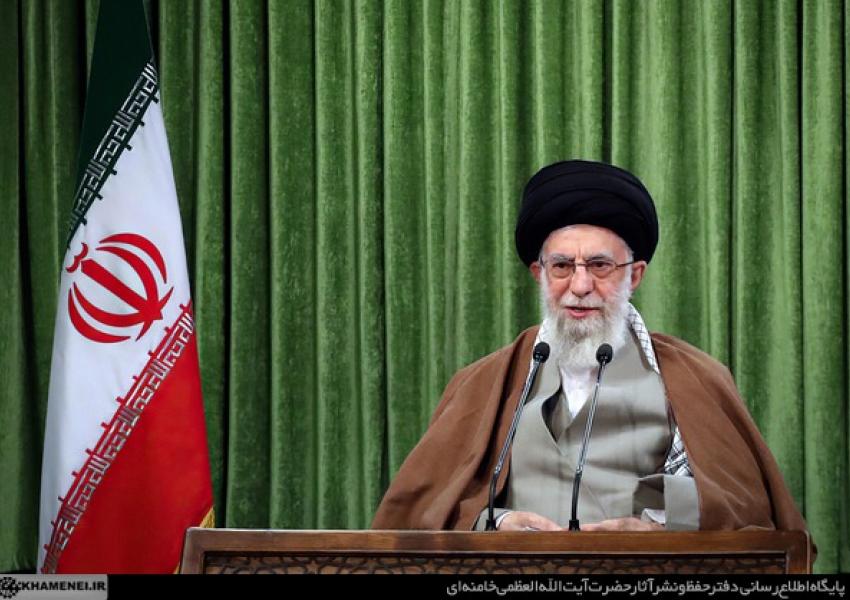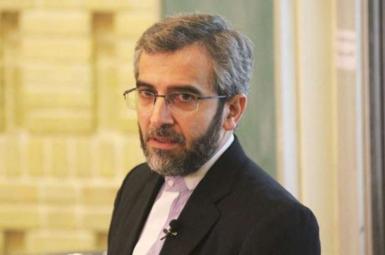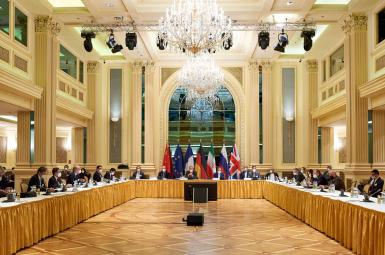
Khamenei Tells US: Nuclear Deal May Change But In Iran's Favor, Not Yours
The Islamic Republic's Supreme Leader Ali Khamenei has reiterated Iran's final policy regarding the 2015 nuclear deal that "the sanctions against Iran should be lifted effectually, in a way that would be verifiable by Iran."
He said that the situation has changed since the 2015 in Iran's interest and any change in the Joint Comprehensive Plan of Action or JCPOA should take place in a way that would favor Iran and not the United States.
Speaking in a televised address on the occasion of the Iranian New Year on Sunday [March 21], Khamenei particularly focused on the issue of Iran's upcoming presidential election as the country's most significant domestic political issue, and the nuclear deal with the world powers as the key sticking point in foreign policy, impacting relations with the United States and the rest of the world.
However, almost everything he said about the nuclear deal and possible negotiations with the United States had already been said before by him or other Iranian officials.
President Joe Biden has indicated his intention to return to the JCPOA that his predecessor abandoned, imposing tough sanctions on Iran, but so far US and European attempts to bring Tehran to the negotiating table have failed, as it insists US must first lift all sanctions before any talks.
Initial reactions by some social media users pointed out that Khamenei's usual “fatal illusions” about the state of the world remain unchanged, and that he is ready to drag Iran and its people with him into an abyss.
In his remarks on domestic political issues Khamenei charged that the US and other countries' spy agencies are trying to turn Iran's presidential election into a lacklustre event by accusing its organizers of engineering the election.
He insisted that foreign intelligence agencies are trying to disappoint the voters through social media by waging psychological warfare. Their aim is to bring about a low turnout in the election by telling the people that their votes will not make a difference in the result.
Khamenei advised that the state should control the social media "so that enemies cannot take advantage of it and hatch conspiracies against Iran." Some reacted to this point saying that imposing limitations on social media may lead to a catastrophe.
Speaking on Iran's differences with the United States over Tehran's nuclear program and its regional and military ambitions, Khamenei said: "Some Americans say that the situation has changed since 2015 when we entered the nuclear agreement. Yes. It has changed in Iran's favor, not in the interest of the United States."
He claimed that "Iran has become more powerful since 2015 and is more self-confident and self-reliant. But you have been disgraced since 2015. An administration came to power in America that ridiculed and humiliated the United States with what it said and what it did and the way it pulled out [of the nuclear agreement]."
Khamenei added: "Yes, the situation has changed not in your interest and if the nuclear deal is going to change, it should be changed in a way to favor Iran, not you."
Addressing international issues, Khamenei's choice of words were at times less than polite. He called President Trump "the former idiot" and said that his maximum pressure policy has failed. He further opined: "He got lost in a fiasco for himself and for his country. The maximum pressure has failed so far and it will continue to fail in the future and Iran will remain dignified and powerful."
Elsewhere in the speech, Khamenei acknowledged that the "surge in production" he predicted last year has not been materialized, however, he claimed that Iran has had "some progress" during the past year.
Khamenei also claimed that "famous economists in the world say Iran is currently the world's 16th strong economy. However, it has many capabilities and potentials and if we use them we will climb to the 12th place in the world economy."
Khamenei’s remark about being a strong economy is clearly contradicted by three consecutive years of serious economic retrenchment, very high inflation and a national currency that has lost its value by eightfold since 2017. Most estimates do not place Iran among the first 20 countries in terms of GDP and the production figures Iran supplies are based on a misleadingly strong currency rate.








